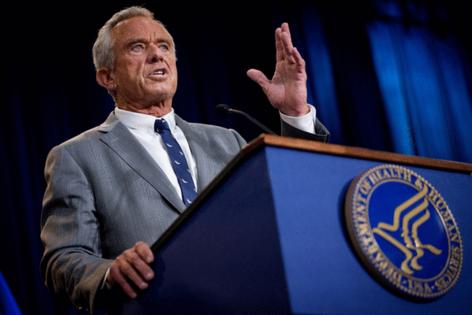Lisa Jarvis: RFK Jr. is the real wild card in protecting Obamacare
Published in Op Eds
The U.S. Supreme Court appears likely to preserve a key component of the Affordable Care Act (Obamacare) that requires insurers to fully cover preventive care such as colon and lung cancer screenings. That’s a huge relief.
The case, Kennedy v. Braidwood Management, has enormous consequences for the health of millions of Americans.
But the positive news comes with a big asterisk: A decision that maintains free preventive care would also put more power over what isn’t covered in the hands of Department of Health and Human Services Secretary Robert F. Kennedy Jr.
The case the Supreme Court heard last week centers on the influence of an independent task force that determines which preventive screenings or treatments must be fully covered by insurers — meaning no out-of-pocket costs for consumers. The panel’s months-long analysis has given Americans free access to treatments such as statins, birth control and pre-exposure prophylaxis (PrEP) to prevent HIV, as well as routine screenings including mammograms, colonoscopies and pap smears.
But a Texas business and several individuals challenged the constitutionality of those independent advisers, claiming they should be appointed by the president and confirmed by the Senate. The government, meanwhile, argued HHS has ultimate say in those decisions.
Lost in the argument heard by the court was the potential real-world impact on Americans’ access to health care.
In the 15 years since the ACA was signed into law, we’ve come to take for granted the many services that insurers cover free. According to KFF, some 100 million privately insured adults used one of the more than 30 preventive services insurers are required to cover. A new study in JAMA Health Forum found that between 2018 and 2022, more than 39 million Americans, or about 30% of people who get their insurance through their employer, received at least one of 10 preventive services provided at no cost under the ACA.
Women in particular benefit from the provision. The researchers found that nearly half of women with employer-provided insurance, or about 24 million, received at least one preventive service in the time frame of the analysis, with cervical cancer screening leading the list of most-used services.
Meanwhile, research has repeatedly shown that out-of-pocket costs can be a barrier to people receiving important services. In a recent example, a 2024 analysis that examined prescription drug data from more than 50,000 Americans, showed that the price of PrEP had a huge impact on whether a consumer picked up their medication. “Even introducing a small cost — going from $0 to $10 for PrEP — more than doubled the chance people wouldn’t take it,” says Lorraine Dean, a social epidemiologist at the Johns Hopkins Bloomberg School of Public Health. “That’s an avoidable risk for HIV.”
That same study also made clear the health consequences of barriers to accessing preventive care. Dean and her colleagues found that 75% of the people who didn’t pick up their first prescription for PrEP never returned for it — and within a year, those patients had a three times higher risk of contracting HIV. That real-world data reinforces findings from an earlier study, that a ruling that takes away fully-covered access to the drugs would lead to more than 2,000 new cases of HIV among men who have sex with men in the first year alone.
Surveys suggest many insurers would continue to maintain coverage of preventive services at no- or low-cost regardless of the outcome of this case. That’s an acknowledgment that screening and other tools ultimately save money by, for example, catching cancer in its early stages or preventing it altogether. Still, a 2023 analysis by KFF found that some 10 million people would be affected by a change in the law.
The Trump administration argued that the secretary of Health and Human Services has broad powers — including the authority to overrule the advice of its expert task force. So, a favorable outcome for the government would also give the health agency chief far more influence over the makeup of the committee, as well as when and if their recommendations are implemented.
In a normal administration with competent leadership, we could expect the HHS secretary to follow the advice of its experts. But handing more power to Kennedy, who has already done so much to undermine evidence-backed preventive care in a variety of areas, is fraught. He could, for example, choose to take preventive care like PrEP and HIV screening off the list of covered services.
Given Kennedy’s troubling history of spreading misinformation about HIV and his recent oversight of painful cuts to HIV research and services at various agencies within HHS, that feels like a reasonable worry.
Let us hope that reason reigns — not just among Supreme Court justices, but at our top health agency as well.
_____
This column reflects the personal views of the author and does not necessarily reflect the opinion of the editorial board or Bloomberg LP and its owners.
Lisa Jarvis is a Bloomberg Opinion columnist covering biotech, health care and the pharmaceutical industry. Previously, she was executive editor of Chemical & Engineering News.
_____
©2025 Bloomberg L.P. Visit bloomberg.com/opinion. Distributed by Tribune Content Agency, LLC.




























































Comments